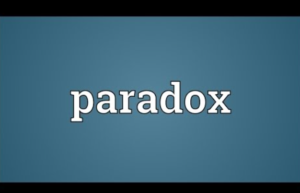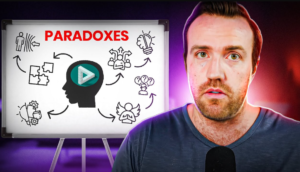
Paradox Betekenis: Ontcijfer de Kracht van Tegenstrijdigheden!
Paradoxes are intriguing linguistic and philosophical phenomena where seemingly valid statements lead to logically unreasonable or self-contradictory conclusions. They challenge our understanding of logic and often prompt deeper reflection on the rules governing language and thought. In literature and rhetoric, paradoxes can enrich the content, adding layers of meaning and stimulating the audience’s curiosity.
Analyzing paradoxes can lead to unexpected insights and illustrate the complexity of seemingly straightforward situations. The pursuit of resolving or understanding paradoxes can also drive philosophical inquiry, pushing thinkers to delve into the nuances of truth, belief, and knowledge.

The Allure Of Paradoxes
Paradoxes pull us into their puzzling world with an irresistible charm. They twist normal logic, often revealing a deeper truth. These brainteasers are timeless. They cause us to pause and ponder, showcasing the beauty of complex thought.
The Intrigue Of Opposing Forces
Imagine a magnet. Its north and south poles attract each other, yet they are opposites. Paradoxes are similar. They combine ideas that seem at odds but exist together. The result is a fascinating blend that teases the mind and invites exploration.
Mankind’s Fascination With Conflicting Ideas
We’ve always enjoyed a good puzzle. Paradoxes present the ultimate challenge. They mix truth with contradiction. This combination is captivating and enigmatic. It’s no wonder that for centuries, paradoxes have remained at the heart of philosophy and storytelling alike.
- They defy simple explanation.
- They reflect life’s complexity.
- They offer endless intellectual stimulation.
Roots Of Paradoxical Thinking
The idea of paradoxes threads through the tapestry of human thought. These mind-boggling concepts push the very boundaries of our understanding. Paradoxical thinking has ancient roots. It has challenged minds across time and space. Let’s delve into these beginnings with focused eyes.
Historical Perspectives On Paradoxes
History brims with sharp minds that wrestled with paradoxes. The Greeks mirrored life’s complexity through Zeno’s Paradoxes. They painted a world where logic and motion conflict. Renaissance scholars kept the torch lit. They questioned reality and existence with paradoxical insights. This journey through time reveals a consistent quest for truth despite contradictions.
- Ancient Greek philosophers used paradoxes to explore logic.
- Medieval thinkers found divine mysteries in paradoxical truths.
- The Renaissance revived paradox as a literary and scientific tool.
Cultural Reflections On Contradictions
Every culture has its tales that challenge common sense. These stories often carry lessons hidden in contradiction. Eastern philosophies use paradoxes to clear the path to enlightenment. They suggest balance is found in embracing opposites. Tribal folklore from around the globe sparks wisdom through riddles and paradoxical proverbs. These narratives suggest contradictions are at the heart of human wisdom.
- Eastern philosophies discuss harmony through contradictory concepts.
- Many proverbs contain wisdom wrapped in paradox.
- Art and literature reflect on human contradiction to express deeper truths.
Famous Paradoxes Uncover
Paradoxes twist our minds and challenge our understanding of reality. They seem to defy logic, presenting situations that are puzzling yet thought-provoking. In the realm of brain teasers and philosophical enigmas, certain paradoxes stand out. They’ve baffled the greatest thinkers and sparked discussions across dinner tables and classrooms alike. Let’s uncover some of these famous paradoxes that have left an indelible mark on our quest to make sense of the nonsensical.

The Cat That Is Both Alive And Dead
Schrödinger’s Cat is a famous thought experiment. It was created by physicist Erwin Schrödinger. This paradox presents a cat in a sealed box with a deadly mechanism. The twist? Until the box is opened, the cat is considered both alive and dead. This paradox plays with the idea of quantum superposition. It brings quantum uncertainty to a scale we can imagine.
The Arrow That Never Reaches Its Target
Next is Zeno’s Arrow Paradox. It comes from the ancient Greek thinker, Zeno of Elea. This paradox intuitively confronts our understanding of motion. An arrow in flight is at rest at every single instant of its flight. So, how can it move to its target? Zeno says, if at each moment the arrow is still, then it can never move. This paradox makes us question the very nature of movement itself.
Paradoxes In Literature And Art
Paradoxes in Literature and Art stir the imagination. They twist reality and challenge the mind. These creative contradictions play a vital role, offering depth and insight. They urge readers and viewers to look beyond the obvious. Artists and authors wield paradoxes as tools to create works fraught with meaning and rich in thought-provocation.
The Twisted Tales Of Storytelling
In literature, paradoxes take readers on a journey through complex narratives. They reveal truths within contradictions. Classic stories are replete with characters and plots that embody paradoxes. Think of Oscar Wilde’s witty statements that seem to oppose themselves yet reveal a deeper understanding.
- Heroes with flaws
- Villains with virtues
- Endings that are also beginnings
These paradoxical elements drive plots and develop characters. They keep readers engaged. It’s the unexpected twist that makes a story memorable. ’The child is father to the man’, a line by Wordsworth, wonderfully illustrates this concept.
Visual Artwork That Defies Logic
Visual arts also brim with paradoxes. Artists like MC Escher and Salvador Dalí shaped impossible worlds. Their works force viewers to question their perceptions. The famed Penrose stairs present an endless loop defying gravity. It symbolizes the impossible made possible on canvas.
| Artist | Notable Work | Paradox |
|---|---|---|
| MC Escher | Ascending and Descending | A staircase that never ends |
| René Magritte | The Treachery of Images | A pipe that is not a pipe |
In these works, the line between reality and illusion blurs. They embody paradoxes, challenging viewers to rethink their perspective. Visual art with paradoxes is not just to be seen; it’s to be experienced. Step into the surreal, where logical norms hold no sway. This is the magic of paradoxes in art. They invite you to a world where the eye deceives and the mind opens.
Contradictions In Science And Technology
Science and technology often present ideas that twist our minds. These are not mistakes but hints to deeper truths.
Paradoxes challenge our understanding. They force us to think in new ways. A paradox is a statement that seems to contradict itself. Yet, it could be true. Science loves to tackle paradoxes, turning them into sources of innovation.

Quantum Quirks And Cosmic Oddities
Quantum mechanics reveals particles acting in odd ways. This field holds many paradoxes. One famous paradox is Schrödinger’s Cat. It introduces the concept of superposition, where something can exist in multiple states at once.
- Particles can be in two places at the same time.
- Quantum entanglement seems to allow instant communication over vast distances.
- These oddities are vital for new technology like quantum computers.
Cosmic mysteries also pose paradoxes. Take black holes, for instance. They trap light, making them impossible to see. Yet, their existence is pivotal in understanding our universe.
Technological Advancements Through Paradoxical Innovations
Innovations often arise from paradoxical thinking. Every new invention starts with an idea that seems impossible at first.
| Paradox | Innovation |
|---|---|
| Aerodynamic Paradox | Wing designs for aircraft that fly more efficiently |
| Allais Paradox | Insights into human decision-making, affecting how we build smarter AI |
| Dichotomy Paradox | Advancements in calculus and physics |
3D printing once seemed like a paradox—creating three-dimensional objects from a flat surface. Now, it is transforming how we make everything. Such innovations are testaments to the power of paradoxical thinking in driving technology forward.
The Human Mind And Paradoxical Thinking
The human mind often grapples with complex ideas and concepts that seem to contradict themselves. This is the world of paradoxes. They twist our thinking and challenge our understanding of reality. Paradoxical thinking can lead to unexpected insights and innovative solutions.
Cognitive Dissonance And Personal Growth
As we encounter new information that conflicts with our existing beliefs, we experience cognitive dissonance. This mental discomfort pushes us towards adaptation and learning. Through resolving these conflicts, we grow intellectually and emotionally.
- Accepting challenge: Embracing cognitive dissonance fosters personal development.
- Flexible thinking: The ability to hold two opposing ideas simultaneously enhances our problem-solving skills.
- New perspectives: Cognitive dissonance often leads to fresh viewpoints and deeper understanding.
The Role Of Contradictions In Decision-making
Contradictions are not just roadblocks; they are tools for better decision-making. They help us weigh different aspects of a problem and consider multiple angles. Let’s dig deeper:
| Process | Benefit |
|---|---|
| Identifying contradictions | Aids in clarifying goals and values |
| Evaluating both sides | Promotes balanced judgment |
| Seeking resolution | Leads to more informed decisions |
In the face of conflicting choices, embracing paradox can bring clarity. It can also highlight creative options we might otherwise overlook. Hence, contradictions should not be feared but utilized as stepping stones to more effective decision-making.
Philosophical Implications And Debates
Paradoxes spark debate and challenge our understanding. They push the boundaries of thought and reason. Philosophers have long grappled with paradoxes. They impact ethical viewpoints and scientific theories. Read on to delve into the philosophical depths that paradoxes uncover.
Ethical Dilemmas Rooted In Paradoxes
Ethical dilemmas often arise from paradoxical situations. They raise critical questions about right and wrong. Such dilemmas force us to confront contradictory elements within moral frameworks.
- Is it ever moral to tell a lie?
- Can justice include pardoning the morally guilty?
The Influence Of Paradoxes On Thought Experiments
Thought experiments illustrate how paradoxes influence philosophical inquiry. Scenarios that at first seem impossible offer new insights. They help to refine our ideas and beliefs.
- Schrödinger’s Cat: Examines quantum mechanics and reality.
- Trolley Problem: Explores the ethics of sacrifice and choice.
Embracing The Paradoxical In Everyday Life
Embracing the Paradoxical in Everyday Life opens up a world of wonder. Paradoxes challenge our thinking. They push us beyond black and white. Life’s rich tapestry weaves in paradoxes, making our journey intriguing. Here, we delve into life’s contradictions and find serenity in their midst. We learn from them, balance them, and thrive.
Life Lessons From Contradictions
Everyday life brings lessons wrapped in contradictions. They demand deep thinking. They often seem confusing but are enlightening. Embrace these lessons:
- Acceptance Leads to Change: When we accept things as they are, we often find avenues for change.
- The More You Give, The More You Receive: Generosity returns to us in unexpected ways.
- Failure as a Stepping Stone: Every failure can lead to a success, teaching us resilience.
- Silence is Loud: In silence, we hear thoughts and ideas that clamor for attention.
Finding Balance Amidst Duality
Duality is life’s constant companion. Balance within this duality is essential. Here’s how to find it:
- Embrace Both Sides: Acknowledge the dual nature of things. Accept the yin and yang of circumstances.
- Seek the Middle Ground: Extremes can lead to imbalance. Find middle ground for harmony.
- Harbor Flexibility: Rigid mindsets impede balance. Being flexible allows adaptation to change.
- Prioritize and Adjust: Recognize priorities. Adjust as needed to align with life’s shifting dynamics.
Future Explorations Of Paradox
The study of paradoxes opens doors to profound insights. These contradictions challenge our understanding and push us towards intellectual growth. In the realm of future explorations, researchers seek to untangle paradoxes, revealing new layers of knowledge.

The Frontier Of Paradoxical Research
Groundbreaking inquiries are shaping the frontier of paradoxical research. Scholars strive to decode these puzzles, as answers may transform countless fields. This uncharted territory promises exciting revelations and a deeper comprehension of the universe around us.
- Mapping paradox impact on scientific principles.
- Investigating paradoxes in advanced mathematics.
- Exploring the role of paradox in human cognition.
Innovative Fields Emerged From Paradoxes
Several innovative fields owe their genesis to paradoxical questions. Clever minds harness these puzzle-like challenges, forging new paths in science and philosophy. Below, a list showcases areas birthed from the cradle of perplexing conundrums.
| Field | Origin Paradox |
|---|---|
| Quantum Mechanics | The Wave-Particle Duality |
| Computational Theory | The Halting Problem |
| Game Theory | The Prisoner’s Dilemma |
Each of these fields progresses by embracing paradox. They serve as beacons of potential, signaling vaster intellectual seas to navigate.
Conclusion
Wrapping up, a paradox offers more than just a brain teaser. It sparks curiosity and challenges our understanding. By dissecting paradoxes, we uncover deeper truths and expand our cognitive boundaries. Dive into these intriguing enigmas and unlock a world of critical thinking and philosophical exploration.




